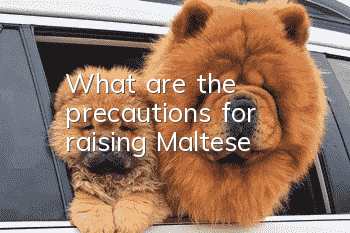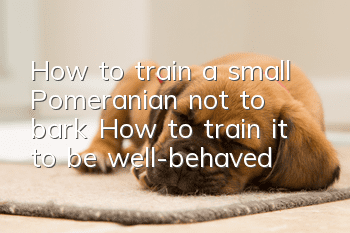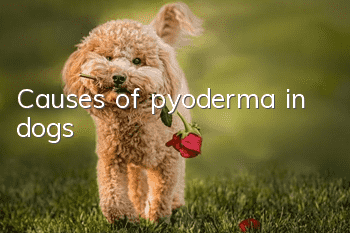What are the precautions for raising Maltese?

Maltese (or Maltese, or translated as Maltese, Angel) is a small white long-haired toy dog with a gentle temperament, cute appearance, coquettish and hospitable, so it is very popular among people and is a very popular dog. One of the species, widely raised around the world.
Maltese's character is quite docile and well-behaved, not afraid of strangers, very hospitable, very family-oriented, and very good at acting coquettishly. Although sometimes small dogs can be neurotic and easily nervous, they are basically a breed that is easy to raise and care for.
Dog Breed History
The Maltese is the oldest dog breed in Europe originating from the Mediterranean region in the Middle Ages. Statues similar to this dog can be found in Egyptian tombs from the 13th century BC. This dog arrived in Britain with the Roman army in about 55 BC. Before the Middle Ages, it had always been the daily companion of European nobles, and its popularity has not diminished since. By the time of Henry VIII of England, the Maltese dog had become popular in England and became the favorite puppy of the palace lady. It was first exhibited in the United States in 1877 as the Maltese Lion Dog. The American Kennel Club registered the Maltese dog in 1888.
Dog breed characteristics
What are the characteristics of the Maltese dog?
Dark eyes and nose are the main focus, and the expression is rich. The tail is lightly curled around the waist. The coat is long and elegant. The ears are droopy, but if the whole body is covered with long hair, the ears will not be visible from the outside.
What is the personality of the Maltese dog?
Maltese's character is quite docile and well-behaved, not afraid of strangers, very hospitable, very family-oriented, and very good at acting coquettishly. Although sometimes small dogs can be neurotic and easily nervous, they are basically a breed that is easy to raise and care for.
Is the Maltese dog suitable for novices or family owners?
The Maltese dog has a gentle and affectionate attitude, eager and lively action. Despite its small size, it has the energy required to be a satisfactory companion dog. Maltese dogs are gentle little dogs that make great pets for the whole family. You can safely let it play with children. Usually in good health and vigorous until late in life. Therefore, it is suitable for novices and family breeding.
Dog knowledge
What precautions should be taken when raising a Maltese dog?
Diet
Maltese have a small appetite, but are interested in many foods, and should avoid developing picky eating habits. As with other dogs, they should not be given overly seasoned human food. The Maltese diet pays more attention to the quality of protein and oil, and can be given appropriatelyFruits that are edible for dogs.
Hair
The long hair of the Maltese is the focus of care. If it is not trimmed and groomed regularly, the fine and soft long hair can easily become tangled into hair balls, which can lead to skin diseases. Therefore, some owners often trim the Maltese to short hair to reduce trouble. . However, the Maltese does not shed much and does not moult seasonally, which is one of its advantages. The pure white long hair is the signature of the Maltese, but it is also the most difficult part for Maltese owners to take care of. They must work hard to prevent the pure white and shiny hair from becoming dirty, yellow, or black, especially around the eyes and mouth. Mao needs to be taken care of more carefully.
Climate Change
Although the Maltese's long hair looks slender and dense, it is actually a single layer of hair. Its origin is in the Mediterranean climate zone, so the Maltese can tolerate climate change and high heat, but it should be avoided in winter. keep warm.
Five major diseases you must know about raising Maltese
There are several genetic diseases that novice parents raising Maltese dogs should pay special attention to, such as nasolacrimal ducts, tracheal collapse, heart disease, knee ectopia, and skin diseases. Most people don’t know that these symptoms can actually be diagnosed through Massage, health food and other methods can relieve symptoms. Come and listen to what the veterinarian has to say to keep Maltese healthy and happy!
There has been a great debate in the zoological community about the origin of the Maltese dog. There is no doubt that the breed has existed on the Mediterranean island of Malta, a British territory, for a long time, but did the Maltese really originate from this small island?
The Maltese dog has a history of nearly 3,000 years. In ancient times, it was deeply pampered by noble ladies for its dignified and elegant posture. Lifelike artistic images of Maltese dogs can often be seen in the surviving handicrafts and art works along the Mediterranean coast. An image similar to the Maltese dog is depicted on a Greek amphora found in the Etruscan town of Vulci.
The exact origins of the Maltese are unknown, but some believe they are descended from a spitz-type dog found in a Swiss lake site and selectively bred to achieve their small size. There is also some evidence that the breed originated in Asia, related to the Tibetan Terrier, and these dogs may have traveled through the Middle East to Europe as nomadic tribes migrated. Some scholars believe that Maltese dogs were used to control rats.
Recommended Good Things
Aineng Pet Odor Eliminating Disinfectant can effectively remove body odor/feces odor and other odor molecules! Effective in treating skin diseases caused by fungi/bacteria! Can kill parvovirus/dogsPestivirus/coronavirusetc!
It is edible grade for pets, does not contain fragrances, does not contain chemicals, can be sprayed directly, and is harmless to human pets!
Consultation: 13028809308 (WeChat synchronization)
Scan the QR code on WeChat to enter the purchase
- Does dog distemper cause fever?
- Can a Czech Wolfdog have two owners?
- French Dou's hind legs were suddenly paralyzed and died a few days later
- Bichon Frize vomits yellow water with foam
- How can you tell how big a native dog will grow? You can’t see it at birth, but at the day after tomorrow!
- Late stage pyometra in dogs must be treated in time!
- What problems should you pay attention to when raising a dog? Most dog owners are making the same mistakes!
- How to know if your dog has a cold? The owner needs to distinguish between real and fake colds!
- The prerequisite for the ten-day observation method is not to do nothing and wait for ten days!
- What can dogs with diabetes eat? Diet choices are very particular.



